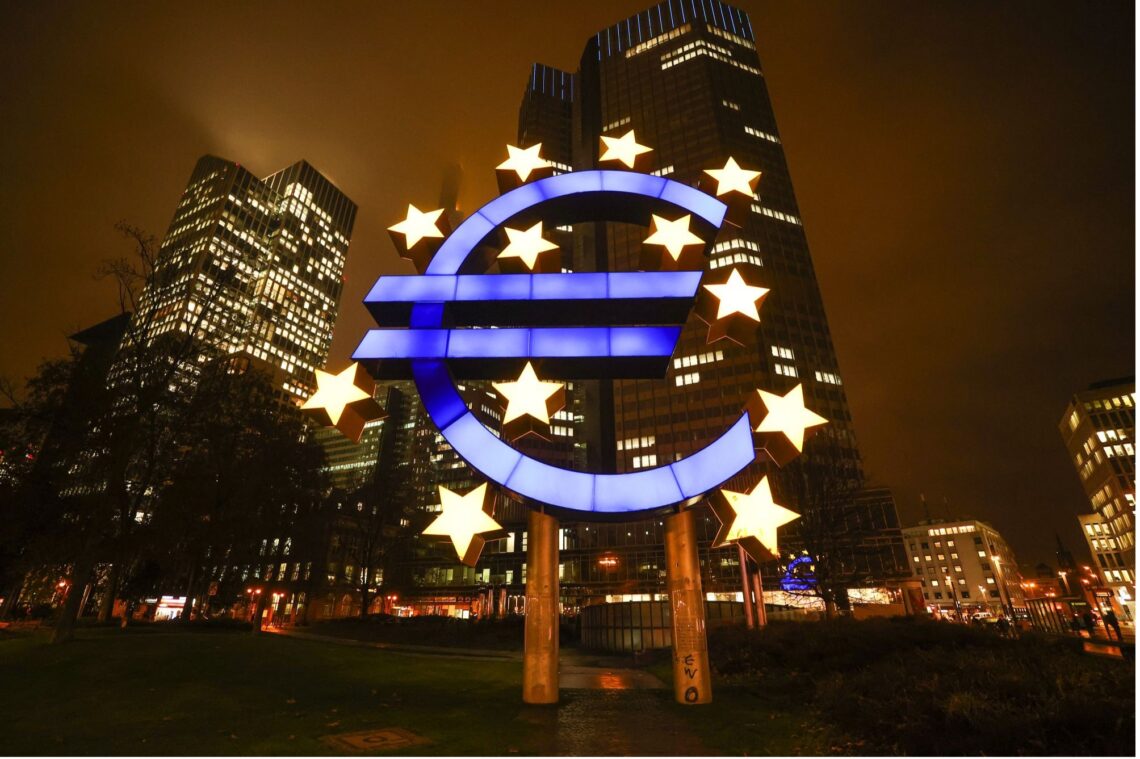The ECB’s rush toward a digital euro
The European Central Bank is gearing up to introduce a “digital euro”. Doing so might not only give the ECB huge powers of surveillance over transactions, but also hand it the tools to strong-arm savers into spending.

In a nutshell
- The ECB is moving fast to introduce a digital currency
- The technology behind the digital euro could threaten Europeans’ privacy
- At the same time, a digital currency could hugely increase the ECB's economic influence
In the coming weeks, the European Central Bank (ECB) will announce whether it will issue a “digital euro” within the next four years. Many experts believe it will.
A preparation phase for what could become a full-fledged central bank digital currency (CBDC) for the eurozone began several months ago with the creation of a “Eurosystem Task Force” to explore the possibility. ECB executive board member Fabio Panetta presides over the high-level working group, which released a report on the subject in October 2020. The document lays out the challenges, design principles and possible technical features of an electronic form of cash for Europe.
Threat to privacy
Few topics in finance polarize opinions as much as the digital euro. Most commentators are eager for an innovative, convenient and secure mode of payment that would modernize financial infrastructure and, ultimately, money itself.
Others fear the solution could become a victim of its own success. When tens of millions of households and firms start transferring money from their accounts at commercial banks to their electronic wallets or accounts at the ECB, it could amount to a digital bank run. The eurozone’s commercial banks would lose trillions of euros, and potentially even their vital role in funding the economy. The ECB’s balance sheet would increase considerably.
The digital euro could be the last straw for banks suffering from chronic low profitability as a legacy of the 2008 crisis.
The digital euro could be the last straw for banks suffering from chronic low profitability as a legacy of the 2008 crisis, especially with the sharp rise of new bad debt related to the pandemic. To avoid the collapse of the banking sector, and to prevent the use of the digital euro as a form of investment, the ECB has proposed limiting the amount of digital cash a user can hold to 3,000 euros.
Mr. Panetta says that the digital euro would provide the ECB with “real-time information on deposit flows, enabling a swift reaction if needed.” That, however, could infringe on citizens’ privacy. Some commentators warn that, akin to governments’ heavy-handed Covid-19 responses, the digital euro could lead European nations further down the path to becoming “surveillance state regimes,” in which financial privacy and individual liberty are increasingly sacrificed to technocratic notions of public safety, efficiency and transparency.
Aware that implementing a CBDC will be extraordinarily complex, the ECB launched a public consultation at the end of last year. Over 8,000 citizens, companies, industry representatives and academics responded to the online questionnaire – a record for ECB public consultations. Some 41 percent of the respondents expressed concerns over privacy, an issue the central bank promises not to treat lightly.
Facts & figures
How would a central bank digital currency work?
For end consumers, many of whom today already use digital means to make transactions, either through bank transfers on a computer or via an app like Google Pay on their phones, using digital euros or dollars might not look so different than what they are used to. The crucial change will be on the back end. Instead of being held at a commercial bank, the digital currency would be held in an account at the central bank. Using blockchain technology, the central bank would have its own secure ledger, meaning transactions could occur instantly, rather than having to go through an intermediary that “clears” the transfer of funds as occurs today.
Monetary competition
But if the introduction of a digital euro is such a controversial issue, why rush it? Why start during a global health and economic crisis?
ECB officials keep stressing the matter’s urgency. “The digital euro is not an option; it’s something we just have to do,” Vice President Luis de Guindos asserts. The central bank needs to stand ready in case several “plausible” scenarios materialize, proponents say. The most pressing of these, according to the Eurosystem report, is that foreign CBDCs or private digital payments could become widely adopted in the eurozone.

The ECB could see its monopoly status as supplier of money threatened, notably by the People’s Bank of China. For the moment, the latter is still experimenting with issuing a “digital yuan” within a pilot scheme limited to major cities. The so-called Digital Currency Electronic Payment should be fully operational shortly. Beijing might quickly want to see it exported as part of China’s quest for global influence.
The prospect of engaging in a monetary competition on its home turf with a powerful nondemocratic nation, and the threat of that nation gaining access to crucial economic and financial data, poses a huge challenge for the ECB. The bank is trying to head off that scenario before it can materialize.
Meanwhile, developing a digital currency could propel the ECB into a leadership position in the West, well ahead of the United States Federal Reserve, whose “digital dollar” project is lagging for political reasons. It could provide a golden opportunity for the European Union not only to challenge the dollar’s long-standing dominance, but to strengthen the international role of its common currency.
Big-tech neutralizer
The other dreaded scenario is that America’s big technology corporations, especially Google, Amazon, Facebook and Apple, will end up gaining commanding market positions in financial intermediation, including in Europe, simply by leveraging the data they have gathered over the years.
With over 2.7 billion monthly active users, Facebook is the biggest social network in the world. In 2019, its proposal to create its own virtual currency (soon to be launched under the name Diem) was a wake-up call for central banks, including the ECB and the Fed, which did what they could to oppose the project.
The guardians of centralized finance want to ensure that “sovereign money” remains at the heart of the European system.
Facebook is not the only global company that plans to issue “stablecoins” (cryptocurrency tokens with stable prices). Amazon recently announced plans for its own global digital currency. Google could be there soon as well. Because they offer a range of services that are easily integrated, these tech giants could threaten competition by bundling software with their own cryptocurrency services, propping up their currencies with funding from other divisions or forcing competitors to use their digital money.
Mr. Panetta says the phenomenon could endanger “monetary sovereignty” and financial stability. If large private corporations were to win the digital money race, Europeans could soon become dependent on “technologies governed elsewhere,” Mr. Panetta warns. The hope is that the digital euro could act as an antidote against what American sociologist Shoshana Zuboff calls “surveillance capitalism.”
As if all that were not enough, an emerging sector of “decentralized finance,” built on blockchain technology and cryptocurrencies, is transforming a range of industries, reaching from insurance to exchanges, credit and lending. This presents another challenge for the guardians of centralized finance who, more than ever, want to ensure that “sovereign money” remains at the heart of the European system. Unsurprisingly, they call for “global regulation” of what ECB President Christine Lagarde mockingly called Bitcoin’s “funny business.”
The end of cash?
The Eurosystem report presents a few more scenarios that would justify issuing a digital euro. One is the occurrence of “extreme” events such as cyberattacks, natural disasters or epidemics that temporarily hamper the provision of payment services. Then there are two interrelated trends, hastened by the coronavirus crisis: the digitization of economies and the decline in the use of cash. In a world where “social distancing” and “contactless” have become new watchwords, demand for electronic payments is on the rise. The digital euro would foremost be a way to “satisfy consumer preferences,” Mr. Panetta insists.
However, the report also acknowledges that, despite the fears and limitations brought about by Covid-19, physical cash continues to be eurozone households’ preferred means of payment for daily purchases. Moreover, demand for banknotes and coins persists as a “means of precautionary savings,” thanks to their “function as a store of value,” a study by the Banque de France points out. Europeans are obviously not ready for life to become completely cash free.

What if it were not consumers, but the central bank itself that wanted to take cash out of circulation? It is not such a far-fetched suspicion, especially given one final reason the report puts forth: the ECB could use the digital euro to provide a “new transmission channel” for its monetary policy, which has been running out of ammunition.
If the digital euro were operational, the central bank could adjust its methods to “directly influence consumption and investment choices of the nonfinancial sector,” the report suggests. Monetary and fiscal policy would be intertwined like never before. According to policy needs, “helicopter money” that would flow directly into the digital wallets or accounts citizens would have at the ECB could be alternated with “financial repression” – in which savers are penalized with negative interest rates.
As long as cash remains in place, policies like these, which aim to monetize debt, are limited by a lower interest rate boundary of zero. If interest rates went too deep into negative territory, consumers would flee to cash. Once cash is gone, however, they would be trapped. Policymakers would be free to set rates as low as they see fit.
For years, researchers of the International Monetary Fund have advocated a swift transition to a cashless society. They want to give monetary policy a new elan. The digital euro could be an important step in that direction. Until more studies are conducted, the Eurosystem’s report refuses to further elaborate on the topic. To reassure European savers, it insists that the digital euro should “complement cash, not replace it.”
Who gets the data?
The report mentions a range of advantages to digital currencies, such as social inclusion, simplicity, interoperability with other payment solutions, cost reduction and even climate considerations. Brussels-based think-tank Positive Money Europe adds another: the digital euro would remove the banking system’s privileged access to central bank money. Whether token- or account-based, it would allow citizens and firms to use a digital form of central bank fiat money, accessible to everyone and – contrary to commercial bank money – unattached to debt. The argument goes that once the digital euro is available, people will have “more freedom with their money.”
The ECB will likely use the digital euro to closely track people’s spending patterns and alert authorities in ‘suspicious’ cases.
Positive Money is right that the digital euro could act as a bulwark against a handful of powerful private financial companies that collude to control ever-larger parts of the money and payment system and to monitor transactions. And, as Mr. Panetta claims, unlike private suppliers of payment systems, the ECB has “no commercial interests related to consumer data.”
But while it may not have a commercial interest in such data, the ECB will likely use the digital euro to closely track people’s spending patterns and alert authorities in “suspicious” cases. “Anonymity must be ruled out,” the report states.
This reveals the constant tension at the heart of the digital euro project between privacy and policing. In the public consultation, the ECB asked what measures should be taken to ensure an “appropriate degree of privacy and protection of personal data” in the use of a digital euro, while also “taking into account anti-money laundering requirements, and combating the financing of terrorism and tax evasion.”
Outlook
As Chris Giancarlo, cofounder of The Digital Dollar Project, points out, a key challenge for central banks will be to code into the architecture of digital money a proper zone of privacy, and to use surveillance only when crime is suspected. A CBDC that is not enshrined in democracy, pluralism and individual liberty leaves the door open to authoritarianism and mass surveillance.
The question is whether unelected technocrats, fretting over financial crime, should be making such important decisions for Europe’s future on their own. Short periods of “public consultation” may not be enough for citizens’ voices to be heard.








